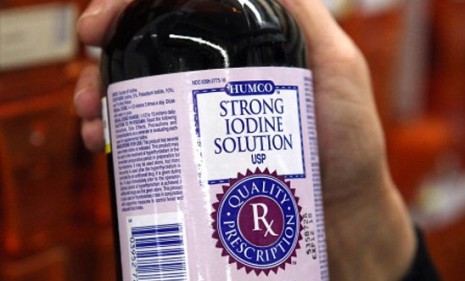California's radiation panic: 6 key questions
The United Nations projects that a plume of radiation from Japan will reach California on Friday. Here, a brief guide to the concerns

A free daily email with the biggest news stories of the day – and the best features from TheWeek.com
You are now subscribed
Your newsletter sign-up was successful
Here's one bit of good news about the radioactive gas leaking out of Japan's crippled Fukushima Daiichi reactors: It is largely blowing out to sea, sparing much of Japan's population from further disaster. Crossing the Pacific, the potentially toxic plume is projected to hit Southern California on Friday, before spreading over the Southwest. It's expected that radiation levels will be extremely low, but reports have nonetheless sparked some panic in the Golden State. Here's a brief guide:
Do Californians face a serious health risk?
No, according to nuclear experts, meteorologists, and public health officials. Radiation has not been detected anywhere on the West Coast yet, and predictions that the plume would reach California were calculated way back on Tuesday; its path could change if the winds shift. Any radiation that might reach California would be nearly undetectable, and "unlikely to present any risk to the American public," said Gregory Jaczko, head of the U.S. Nuclear Regulatory Commission, on Monday.
The Week
Escape your echo chamber. Get the facts behind the news, plus analysis from multiple perspectives.

Sign up for The Week's Free Newsletters
From our morning news briefing to a weekly Good News Newsletter, get the best of The Week delivered directly to your inbox.
From our morning news briefing to a weekly Good News Newsletter, get the best of The Week delivered directly to your inbox.
What if Japan's reactors completely melt down?
A highly improbable combination of full meltdown and just the right weather conditions could cause significant levels of radiation to hit the U.S., says Charlie Zender, an atmospheric physicist at U.C. Irvine. But this is very unlikely, both Zender and Jaczko say.
But some Americans are still panicking, right?
Yes. They're stocking up on potassium iodide "anti-radiation" pills and Geiger counters. All three federally approved makers of potassium iodide are sold out through mid-April, and some online merchants are selling $10 packets of the pills for $300 to $400. Since kids are the most vulnerable to radiation, many medication scavengers are "panicked parents," says Amy Graff in the San Francisco Chronicle. "As parents we cope with our concerns by doing things that make us feel like we're actively dealing with the situation, whether it exists or not."
A free daily email with the biggest news stories of the day – and the best features from TheWeek.com
Will potassium iodide pills do any good?
They could actually do more harm than good. When taken within an hour of heavy exposure to radioactive iodine-131, which is part of the Japanese plume, the pills can help prevent thyroid cancer. But they can also cause serious side effects, and can only be taken for two weeks before they essentially shut down your thyroid. "It is inappropriate, foolhardy, and dangerous to be taking iodine supplements at this time," says thyroid expert Dr. Leonard Wartofsky.
Can airplanes bring Japanese radiation to the U.S.?
That's a threat airlines and U.S. aviation officials are taking seriously, especially after trace amounts of radiation were found in the cargo hold of some Tokyo-Chicago flights on Wednesday. Some of the radiation was from medical equipment, but officials said they are now scanning Japan-based aircraft and cargo holds "out of an abundance of caution."
What about sushi?
Food-supply contamination is one of the big concerns sparked by the Japanese nuclear disaster. But most of the risk is borne by the Japanese, who eat the vast majority of the food they produce. Less than 4 percent of U.S. food imports are from Japan, and the FDA and other government agencies say they will be diligently checking that food. As for sushi-grade fish, there is a risk, but an FDA spokeswoman says that radioactive material is so diluted by seawater that "fish and seafood are likely to be unaffected" by the disaster.
Sources: New York Times, Bloomberg Businessweek, Orange County Register, Wall Street Journal, MSNBC, Reuters, National Geographic, San Francisco Chronicle, Chicago Tribune, Fox News, Care2
-
 Why is the Trump administration talking about ‘Western civilization’?
Why is the Trump administration talking about ‘Western civilization’?Talking Points Rubio says Europe, US bonded by religion and ancestry
-
 Quentin Deranque: a student’s death energizes the French far right
Quentin Deranque: a student’s death energizes the French far rightIN THE SPOTLIGHT Reactions to the violent killing of an ultraconservative activist offer a glimpse at the culture wars roiling France ahead of next year’s elections
-
 Secured vs. unsecured loans: how do they differ and which is better?
Secured vs. unsecured loans: how do they differ and which is better?the explainer They are distinguished by the level of risk and the inclusion of collateral